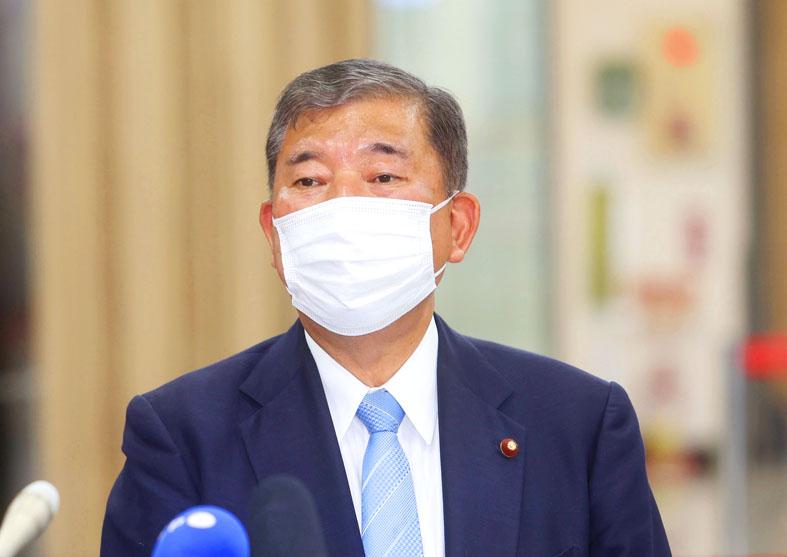A Japanese parliamentary delegation led by former Japanese minister of defense Shigeru Ishiba arrived in Taiwan yesterday.
Speaking to reporters upon arrival at Taipei International Airport (Songshan airport), Ishiba said that the delegation would hold talks with Taiwanese officials on regional security issues.
The visit is to last until Saturday. Three Japanese lawmakers who had been part of the delegation had to drop out after testing positive for COVID-19.

Photo: CNA
The four-person delegation would meet with President Tsai Ing-wen (蔡英文), Vice President William Lai (賴清德), Minister of Foreign Affairs Joseph Wu (吳釗燮) and other senior government officials, the Ministry of Foreign Affairs said.
They would also visit the Executive Yuan, the Legislative Yuan, the Ministry of National Defense and local think tanks to exchange views with officials and academics on Taiwan-Japan security issues, it said.
Delegation members would also visit Wuzhi Mountain Military Cemetery in New Taipei City to pay their respects to former president Lee Teng-hui (李登輝). Lee, Taiwan’s first popularly elected president who passed away in 2020 at the age of 97, spoke fluent Japanese and was known for his pro-Japan views.
The delegation also includes former Japanese minister of defense Yasukazu Hamada, former Japanese deputy minister of defense Akihisa Nakashima and Takayuki Shimizu.
Ishiba, Hamada and Nakashima are members of the lower House of Representatives, while Shimizu is a member of the upper House of Councilors.
They are members of a Japanese parliamentarian association on security issues established by Ishiba and Hamada in November 2019, the foreign ministry said.
Ishiba, 65, of Japan’s ruling Liberal Democratic Party, ran for party chair in 2012, but lost to former Japanese prime minister Shinzo Abe.
Kuo Yu-jen (郭育仁), executive director of the Institute for National Policy Research and an expert on Japanese affairs, told the Central News Agency (CNA) that this is the highest-level Japanese delegation to visit Taiwan since the two countries severed diplomatic ties in 1972.
The visit comes as the Japanese government prepares to publish three defense papers by the end of this year, Kuo said, adding that the trip is likely meant for the lawmakers to evaluate the situation in Taiwan.
Another Japan expert, Wang Tsun-yen (王尊彥) of the Institute for National Defense and Security Research, told the CNA that Japan referred to Taiwan as an “extremely important partner” in its annual defense white paper published last week, which has a significantly wider coverage of the Taiwan issue than last year’s paper.
This shows that Tokyo has recognized Taipei’s strategic position in relation to Japan and is putting more emphasis on Taiwan’s security, Wang said.

Alain Robert, known as the "French Spider-Man," praised Alex Honnold as exceptionally well-prepared after the US climber completed a free solo ascent of Taipei 101 yesterday. Robert said Honnold's ascent of the 508m-tall skyscraper in just more than one-and-a-half hours without using safety ropes or equipment was a remarkable achievement. "This is my life," he said in an interview conducted in French, adding that he liked the feeling of being "on the edge of danger." The 63-year-old Frenchman climbed Taipei 101 using ropes in December 2004, taking about four hours to reach the top. On a one-to-10 scale of difficulty, Robert said Taipei 101

Nipah virus infection is to be officially listed as a category 5 notifiable infectious disease in Taiwan in March, while clinical treatment guidelines are being formulated, the Centers for Disease Control (CDC) said yesterday. With Nipah infections being reported in other countries and considering its relatively high fatality rate, the centers on Jan. 16 announced that it would be listed as a notifiable infectious disease to bolster the nation’s systematic early warning system and increase public awareness, the CDC said. Bangladesh reported four fatal cases last year in separate districts, with three linked to raw date palm sap consumption, CDC Epidemic Intelligence

US climber Alex Honnold left Taiwan this morning a day after completing a free-solo ascent of Taipei 101, a feat that drew cheers from onlookers and gained widespread international attention. Honnold yesterday scaled the 101-story skyscraper without a rope or safety harness. The climb — the highest urban free-solo ascent ever attempted — took just more than 90 minutes and was streamed live on Netflix. It was covered by major international news outlets including CNN, the New York Times, the Guardian and the Wall Street Journal. As Honnold prepared to leave Taiwan today, he attracted a crowd when he and his wife, Sanni,

Taiwanese and US defense groups are collaborating to introduce deployable, semi-autonomous manufacturing systems for drones and components in a boost to the nation’s supply chain resilience. Taiwan’s G-Tech Optroelectronics Corp subsidiary GTOC and the US’ Aerkomm Inc on Friday announced an agreement with fellow US-based Firestorm Lab to adopt the latter’s xCell, a technology featuring 3D printers fitted in 6.1m container units. The systems enable aerial platforms and parts to be produced in high volumes from dispersed nodes capable of rapid redeployment, to minimize the risk of enemy strikes and to meet field requirements, they said. Firestorm chief technology officer Ian Muceus said